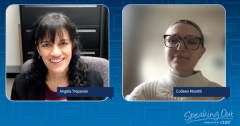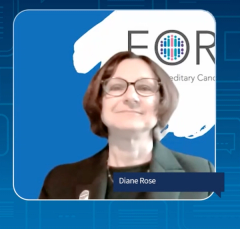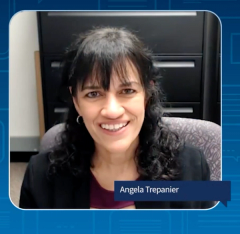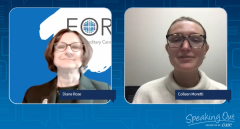
Support is ‘Critical’ for Those Affected By Hereditary Cancers
As a part of its “Speaking Out” video series, on behalf of FORCE, CURE® spoke with Diane Rose, their vice president of volunteer programs about the importance of support for those affected by hereditary cancers.
Episodes in this series
Transcription: Colleen Moretti: Why is support important for those with an increased risk of breast cancer?
Diane Rose: Support is really critical for everyone in our community, those who are diagnosed with cancer and those who are at high risk due to a gene mutation — and we refer to those people as “pre-vivors.” We also have people who know there's a mutation in their family, but they haven't tested yet, or those who have tested and they received a negative test result or a variant of unknown significance. And then we also have to think about their caregivers, all of these people need support. People are affected by hereditary cancer, have different mutations that put them at risk for breast cancer and other cancers and they have different questions, they're in different situations. Many of these decisions that must be made really depend on your cancer diagnosis or that risk of cancer. And so, it's so beneficial to talk with someone who understands what you're going through. For people who are diagnosed with breast cancer, they're going to have specific questions and very specific decisions depending on that diagnosis. And many of the genes that increased risk for breast cancer also increased the risk for other cancers. So it's important to talk with someone who has been personally affected by hereditary cancer, has that same gene mutation, has the same type of breast cancer and the same risk for other cancers so that they can really have a comprehensive discussion to help make the best possible decisions for their care.
Moretti: How can support benefit those people who are at a higher risk of developing breast cancer?
Rose: Support offers people the chance to connect with someone who's been in the same situation and made similar decisions. We talk about people walking in the same shoes. Many people find comfort, knowing that they aren't alone and that's huge. Knowing that they can talk with someone, or depending on the support platform, maybe they can talk with many others at the same time, who truly understand the decision that they're facing. So, learning about all of your options is very helpful as you're having these conversations. Because people with inherited mutations are at risk for cancer at a younger age, they find that their average risk appears that group of people that they always turn to, may not understand what they're going through and are you know aren't grappling with similar screenings and decisions, all the doctor's appointments that they have to go through on a regular basis. And so these people, while they can offer you support, they might not be able to understand exactly what you're going through and offer that specific support that you will need.
Moretti: What kind of support can FORCE offer for these people?
Rose: FORCE offers a variety of free support programs. We know that people like to receive support in different ways and so we have options for them. And people can find this information on our website under support (facingourrisk.org).
Our peer navigation program matches cancer survivors, or people at high risk or their caregivers to a trained peer navigator volunteer. And that person offers support and resources that are personalized for each person's situation and they do that over the phone and by email. And we match this volunteer to the person that's looking for support based on their cancer diagnosis, their genetic mutation, their age, and then the specific resources that someone is looking for. So it's just really a very personalized experience of support.
We also offer support meetings virtually, and now we are back to in person support meetings. And this is a great place to come together to talk with our trained community group leaders —and that includes genetic counselors — as well as the other attendees in the meetings where you can obtain support you need, but also valuable resources and information in this quiet, caring and safe environment. And it's just a really good opportunity to hear the decisions that others have made and ask them questions: why did they make those decisions, what factors led to those decisions? And so we offer general support meetings where everybody from our community can come into a meeting and talk. But then we also have 11 different community groups that are set up to address very specific needs and concerns from the people who come to those groups. So we have a survivor group and a young survivor group, a previvor group and a young previvor group, LGBTQIA community, men, people of color, meetings in Spanish and American Sign Language, people with lynch syndrome, and caregivers and parents.
We also have an online message boards and a private Facebook group. And those are of course available 24/7 And it's that online connection that people have, you're affected by hereditary cancer where they can still come together as a sense of community. We also have a toll-free helpline, where trained volunteers return calls, and we provide that support in English and in Spanish. And we have a dedicated genetic counselor helpline that's available where a genetic counselor can answer general genetic related questions. And we've just heard over and over how supported people feel who've used our programs talking with someone who truly understands, really helps them gain that information that they need to feel competent and taking the next step.
This transcription has been edited for clarity.








